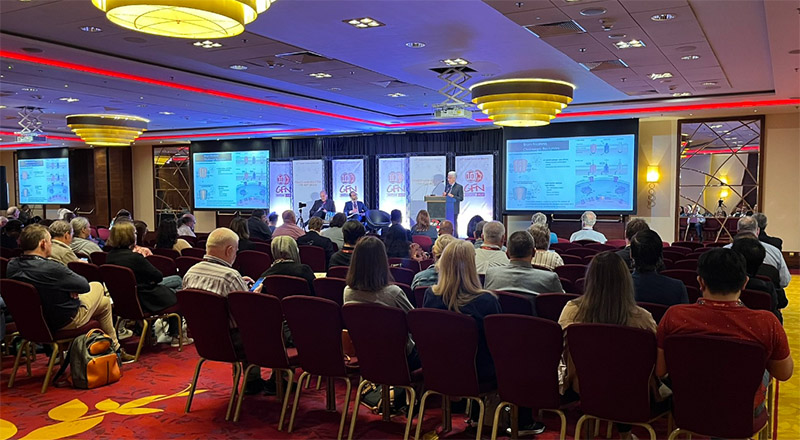Vape electronic cigarettes in Eastern Europe have always been a point of interest. Recently, a global nicotine forum (GFN23) was held in Warsaw, the capital of Poland in Eastern Europe, transmitting a global signal about vape electronic cigarettes, including disposable vape e-cigarettes, reuseable vape device, and other tobacco alternative nicotine products.
Over the past six months, the biggest hot topic in the global vape electronic cigarette inventory has been "vape disposables," which raises issues of vape industry sustainability and the series of impacts on vape electronic cigarette regulatory compliance.
The importance of this meeting is also related to the tenth meeting of the Parties to the WHO Framework Convention on Tobacco Control (FCTC), which aims to find new solutions for the future of nicotine safety. In November, the FCTC meeting will address key issues such as regulation and disclosure of tobacco product ingredients, and regulation of new tobacco product, like vape electronic cigarettes, nicotine pounch.
From this forum, we observed several key points:
01
Vape electronic cigarettes are positioned as the leading choice for harm reduction!
At this Polish meeting, attended by 70 speakers and hundreds of delegates, the theme was "Reducing Tobacco Harm - The Next Decade," focusing on a safer future for nicotine. It highlighted products in the field of vape electronic cigarettes, nicotine pouches, oral tobacco products, and heated tobacco products. The emphasis was on encouraging adults who are unable to quit smoking to switch to safer nicotine products, including vape electronic cigarettes.

Prior to the meeting, Professor Gerry Stimson, Emeritus Professor at Imperial College London and co-founder of GFN23, called on international tobacco control leaders to adopt rational and pragmatic approaches and prioritize saving lives. He stated, "We must set aside ideological issues and support people in quitting smoking by any means available."
In fact, at last year's Global Nicotine Forum, experts encouraged adult smokers who are unable to quit nicotine to switch from harmful combustible or oral products to safer nicotine products, including vape electronic cigarettes and non-tobacco nicotine pouches and heated tobacco. These alternatives have significantly lower risks.
At the nicotine conference, there were both opposing and supporting views on vape electronic cigarettes. Experts emphasized the role of consumer advocacy in shaping e-cigarette policies and the importance of e-cigarette enthusiasts' advocacy. Clive Bates, the moderator and Director of The Counterfactual, stated, "'Consumer advocacy,' which involves telling personal stories to protect consumers, is a winning strategy for regulators and politicians to understand the positive potential of nicotine-containing products."
02
Scholars believe that vape is a "revolutionary product."
The Global Nicotine Forum had participants from many vape electronic cigarette giants, such as Philip Morris International (PMI), British American Tobacco (BAT), as well as individuals from public health organizations involved in tobacco control and representatives from the World Vapers' Association.
Some scholars even described vape electronic cigarettes in this way, believing that vape is a "revolutionary product."
Mark Oates, Director of We Vape and the Snus Users' Association, presented a refreshing perspective.
(Expert market perspectives from Warsaw)
He stated that vape electronic cigarettes are only suitable for smokers and compared them to electric cars because they are revolutionary products. "There will be people who start driving electric cars, even though their internal combustion engine cars have never harmed the environment. We shouldn't say to them, 'You haven't harmed the environment before, so you shouldn't drive.' Therefore, there will be some people who have never smoked but want to use nicotine. It would be better if they use a safer version," he explained.
03
Focus on smokeless regulation, emphasizing regulation of vape electronic cigarettes rather than prohibition.
The issue of prohibition was discussed, focusing on the consequences behind it.
"Reducing harm is not just about eliminating products or behaviors; it recognizes that bans often lead to unforeseen consequences." This was the common opinion among experts gathered in Warsaw.
What should a vape manufacturer prepare from this single?
here are some points that vape manufacturers should consider preparing for in the future:
Emphasizing Product Sustainability: The electronic cigarette industry is becoming increasingly aware of the waste generated by electronic cigarettes. Vape manufacturers should prioritize addressing the issue of electronic cigarette waste and explore ways to promote sustainable practices within the industry. This may involve developing recyclable or biodegradable components, implementing waste management programs, or supporting initiatives that reduce environmental impact.
Supporting Harm Reduction and Safety: Vape manufacturers should continue to focus on developing and promoting safer nicotine products. As the global discourse shifts towards harm reduction, manufacturers should invest in research and development to improve the safety features and efficacy of their products. This includes investing in technologies that minimize potential risks and conducting studies to gather evidence on the harm reduction potential of vape electronic cigarettes compared to traditional combustible cigarettes.
Adapting to Regulatory Changes: Vape manufacturers need to stay informed and adapt to evolving regulatory frameworks governing electronic cigarettes. It is essential to comply with existing regulations and be prepared for potential changes in product restrictions, labeling requirements, and marketing regulations. Keeping up-to-date with the latest guidelines and engaging in constructive dialogues with regulatory authorities can help manufacturers navigate the regulatory landscape effectively.
Exploring Medical Vaping Opportunities: The concept of medical electronic cigarettes was mentioned in the article as a market opportunity that remains underdeveloped. Vape manufacturers may consider exploring the potential for developing medical-grade electronic cigarettes with specific indications and health benefits. Collaborating with healthcare professionals, conducting clinical trials, and obtaining medical certifications could open up new avenues for vape manufacturers and expand their market reach.
Engaging in Advocacy and Consumer Education: Vape manufacturers should actively engage in advocacy efforts to protect consumer rights and promote responsible use of electronic cigarettes. Supporting consumer advocacy groups and initiatives that aim to educate the public and policymakers about the potential benefits and harm reduction aspects of vape electronic cigarettes can help shape positive perceptions and influence regulations in a favorable direction.
By proactively addressing these areas, vape manufacturers can position themselves for future challenges and opportunities in the evolving landscape of the electronic cigarette industry.
